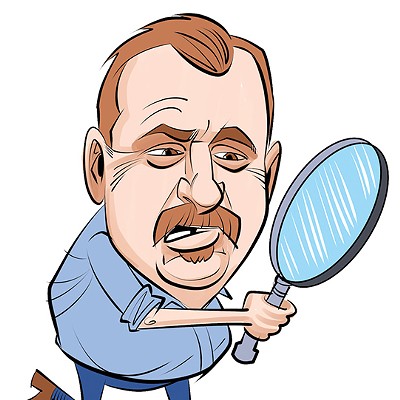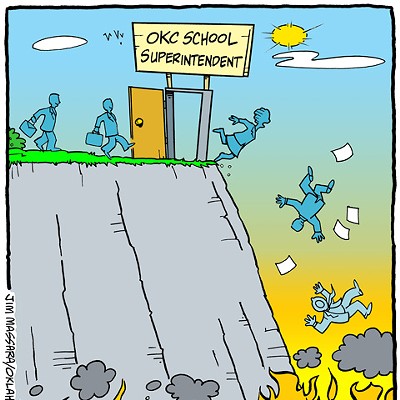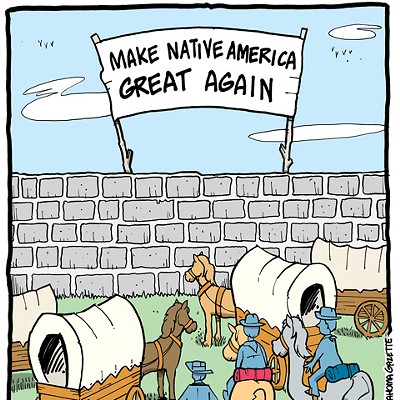Anybody out there fed up with the lack of news in the newspapers and on news programs? Have you noticed all our newspapers have gotten smaller? It's not just The Oklahoman; The New York Times, The Wall Street Journal and USA Today have all shrunk.
Worse yet, the stories are shorter and there are fewer of them. Front pages used to be for the most important stories of the day. Now it's all kinds of oddball local things that used to be buried somewhere in section two or three. National and international news stories are now in the middle of the paper. The "new" Oklahoman is a mix of color and short (very short) summaries. Half the time, I can't tell the news stories from ads because of the color and clutter.
TV news is doing the same thing. Television news lead stories seem to always be about a fire or murder. TV news people like "good video." For all the years I worked in television news, I always believed most of us couldn't care less about a house fire unless it was our house. Then there's the high-speed chase that requires channels 4, 5 and 9 to mobilize helicopters to show us some idiot going 100 miles per hour in the wrong direction.
And is it me, or does every newscast seem to start with "breaking news?" News departments always seem to find a story that " lucky for them " seems to break at exactly 5, 6 and 10 p.m. every day! Who would have thought the news would be so timely?
There is also a lot more editorializing on television and in the papers. Every news anchor seems to want to pass judgment on some issue of the day. Worse yet, they invite the viewers to respond to an Ogle brother in news departments across the city. The Ogles, by the way, are legendary in Oklahoma television news. I worked with father Jack Ogle at channels 4 and 5 in the '70s and '80s. He was one of the most respected names in news for decades. Now, his sons rule the airways of local news.
I always like the "live shot" in the middle of nowhere in the dark with the reporter starting out with the words, "Well, there's nothing happening here right now, but earlier this evening "¦" Wait. If there is nothing happening there right now " and you're going to show video of what happened two hours ago " why are you standing there in the dark with nothing to show us?
You have to love the news "teases" scattered throughout the day. "Tonight at 10 we'll tell you about Bob Stoops quitting," which could be him going on a diet and giving up fries at McDonald's. If it's ratings season, the teases get even better. Then there are the stories about hurricanes in Louisiana or Texas that apparently need a reporter from Oklahoma to explain what's going on. Apparently, Oklahoma news departments don't trust the reporters from the national networks " or even from Louisiana or Texas " to tell us the real truth.
Make no mistake about it: Light news, very short stories, color, editorials and flashy graphics, music and sound effects deliver an audience. Sadly, we baby boomers may be the last generation to read a newspaper. There may be more "news" on television then ever before, but most of the networks have smaller news departments covering it. Rather than pay a reporter, news departments give us "authoritative sources" to help fill the hour and explain what's happening.
Have you ever noticed that, no matter the season, we get three to four minutes of weather in every newscast. It's the dead of summer, not a cloud in the sky, it's 95 degrees and there isn't a chance of any change in the weather, yet we still get three minutes of weather "forecasting." It's snowing, the city is at a standstill and 100 schools are closed, we still get three minutes of weather.
If, on the other hand, there's a chance we might get a tornado, the weather departments pre-empt all programming to tell us "nothing is happening yet, but "¦" Seems to me, if nothing is happening yet, we really don't need them to tell us anything! Despite all their equipment, it appears few weather guys predict the weather by doing what most of us do " look outside.
Most people working in television news are young. Generally speaking, the pay is lousy, the hours are long and you work nights, weekends and holidays. Young TV reporters often have a pretty cynical view of life and old print reporters can be crusty old cynics. Generally, TV reporters quit to earn more money doing other things before they get old. Sooner or later, TV news people come to realize celebrity stardom just doesn't pay the bills and sitting at home watching the news at 10 p.m. is a lot more comfortable than being out in a snowstorm telling people it's cold and snowing!
Orza, a former KOCO-TV anchor, is dean of the Meinders School of Business at Oklahoma City University.












